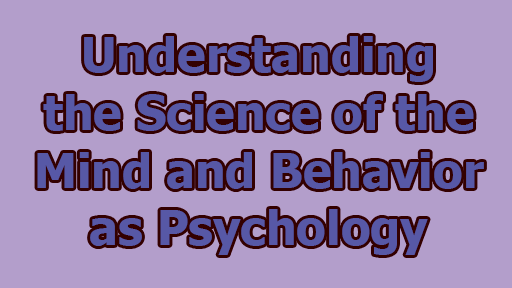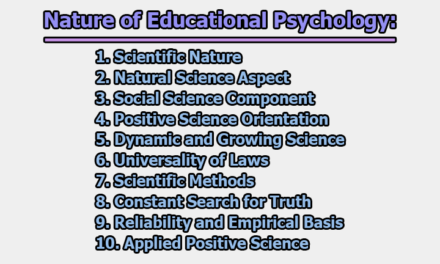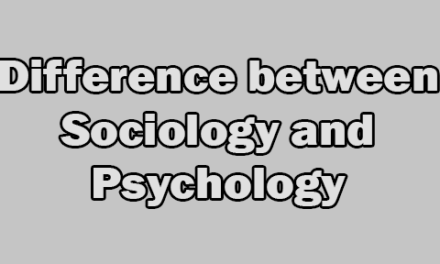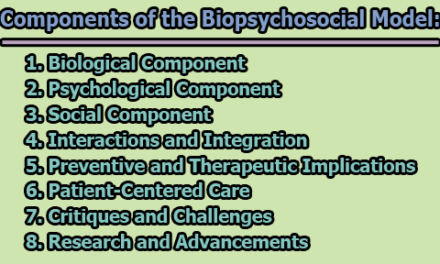Understanding the Science of the Mind and Behavior as Psychology:
The human mind is a complex web of thoughts, emotions, perceptions, and behaviors that have intrigued philosophers, scientists, and scholars for centuries. Psychology, the scientific study of the mind and behavior, seeks to understand the intricate workings of the human mind and how it influences our actions. From examining the depths of consciousness to exploring the causes behind psychological disorders, psychology delves into the realm of the mind, offering insights that are essential for both personal growth and societal advancement. In the rest of the article, we will explore the understanding the science of the mind and behavior as psychology.
Definition and Nature of Psychology:
Psychology can be defined as the scientific study of the mind, behavior, and the underlying processes that drive human and animal experiences. It seeks to uncover the mechanisms that shape human thoughts, emotions, motivations, and actions. At its core, psychology is not only concerned with understanding the “what” of behavior but also with the “why” and “how” behind it.
The nature of psychology is both multifaceted and interdisciplinary. It draws upon insights from various fields, including biology, neuroscience, philosophy, sociology, and even anthropology. It encompasses the study of individual behavior, cognition, emotions, personality, as well as the interactions between individuals and their environment. The nature of psychology extends beyond the individual, encompassing the study of groups, communities, and cultures.
Psychology as a Science:
Is psychology a science? This question has been a subject of debate for decades. The answer is a resounding yes. Psychology adheres to the principles of the scientific method, employing systematic observation, experimentation, and rigorous analysis to gather empirical evidence. It aims to develop theories and models that can explain and predict behavior based on evidence rather than intuition or anecdotal evidence.
Psychology as a science emphasizes objectivity and replicability. It seeks to minimize bias and subjectivity in its investigations, relying on empirical data and statistical analyses to draw conclusions. Moreover, psychology’s scientific nature is reflected in its commitment to constant refinement and revision of theories based on new evidence.
Fields of Psychology:
Psychology is a vast field that encompasses a multitude of specialized areas, each focusing on distinct aspects of human behavior, cognition, and emotion. These fields collectively contribute to our understanding of the complexities of the human mind and its interactions with the world. In this section, we will delve into the key fields of psychology, highlighting their unique characteristics, contributions, and applications.
- Experimental Psychology: Experimental psychology focuses on understanding the basic processes of sensation, perception, learning, memory, and cognition. Experimental psychologists design controlled experiments to manipulate variables and study their effects on behavior and mental processes. Through controlled experiments, researchers gain insights into the underlying mechanisms that govern various aspects of human cognition and behavior.
- Understanding Basic Processes: Experimental psychology is the foundation of psychological research, aiming to unravel the fundamental cognitive and behavioral processes that underlie human experience. Researchers in this field investigate topics such as sensation, perception, learning, memory, and cognition. By conducting controlled experiments, experimental psychologists manipulate variables to explore cause-and-effect relationships, shedding light on the mechanisms that govern human behavior.
- Experimental Design and Methodology: Experimental psychologists design experiments with meticulous precision. They carefully control variables to isolate the impact of specific factors on behavior. Through experimental manipulation, researchers can discern patterns, identify cognitive biases, and uncover the principles that guide decision-making and problem-solving.
- Contributions and Applications: The insights gained from experimental psychology have practical applications across domains. From improving educational strategies to enhancing marketing techniques, this field informs decision-making processes in various sectors. Additionally, experimental research aids in the development of evidence-based interventions for individuals with cognitive impairments or learning difficulties.
- Physiological Psychology: Physiological psychology, also known as behavioral neuroscience, examines the relationship between the brain, nervous system, and behavior. It seeks to understand how neural processes influence behavior, emotions, and cognitive functions. By studying brain structures, neurotransmitters, and neural pathways, physiological psychologists shed light on the intricate connections between the brain and behavior.
- The Brain-Behavior Connection: Physiological psychology, also known as behavioral neuroscience, explores the intricate relationship between the brain, nervous system, and behavior. Researchers investigate how neural processes influence emotions, thoughts, and actions. The field’s fundamental question revolves around how physiological changes within the brain translate into observable behavior.
- Neural Processes and Behavior: Studying neural structures, neurotransmitters, and neural pathways, physiological psychologists gain insights into the mechanisms behind conditions such as depression, anxiety disorders, and addiction. By understanding the neural basis of these disorders, researchers can develop more effective treatments and interventions.
- Implications for Mental Health: Physiological psychology plays a crucial role in advancing mental health research and treatment. Brain imaging techniques, such as functional magnetic resonance imaging (fMRI) and electroencephalography (EEG), provide windows into the brain’s activity. These insights aid in diagnosing neurological disorders and inform therapeutic approaches, contributing to the improvement of individuals’ quality of life.
- Clinical Psychology: Clinical psychology deals with the assessment, diagnosis, and treatment of psychological disorders and mental illnesses. Clinical psychologists work with individuals struggling with a wide range of issues, such as anxiety, depression, schizophrenia, and personality disorders. They employ various therapeutic techniques to help individuals lead healthier and more fulfilling lives.
- Diagnosis and Treatment of Disorders: Clinical psychology focuses on the assessment, diagnosis, and treatment of psychological disorders and mental illnesses. Clinical psychologists work with individuals of all ages to identify psychological challenges and develop strategies for overcoming them. The Diagnostic and Statistical Manual of Mental Disorders (DSM) serves as a foundational resource for diagnosing various conditions.
- Therapeutic Approaches: Clinical psychologists employ diverse therapeutic techniques, including cognitive-behavioral therapy, psychoanalysis, and mindfulness-based interventions. These approaches aim to alleviate symptoms, enhance coping skills, and foster emotional resilience. By providing a safe and supportive environment, clinical psychologists assist individuals in their journey toward improved mental well-being.
- Advancements in Clinical Research: Advancements in clinical research have expanded our understanding of the underlying causes and treatment options for psychological disorders. Research in areas such as neuroscience, genetics, and pharmacology informs the development of targeted interventions. The integration of technology and teletherapy has also widened access to mental health services.
- Counseling Psychology: Counseling psychology shares similarities with clinical psychology but typically focuses on helping individuals navigate life’s challenges, improve their overall well-being, and enhance personal growth. Counselors work with clients to address issues like relationship problems, career transitions, and stress management. The emphasis is on fostering mental health and coping strategies.
- Personal Growth and Well-Being: Counseling psychology shares similarities with clinical psychology but focuses on personal growth, well-being, and adjustment to life’s challenges. Counselors work with individuals, couples, and families to explore their strengths, values, and goals. The emphasis is on developing healthy coping mechanisms and enhancing overall life satisfaction.
- Counseling Techniques: Counseling psychologists utilize various therapeutic techniques, including talk therapy, positive psychology interventions, and solution-focused therapy. These approaches empower clients to identify their strengths and work toward meaningful life changes. The therapeutic relationship between counselor and client serves as a foundation for exploration and growth.
- Diversity and Cultural Considerations: Counseling psychology emphasizes the importance of considering cultural factors in therapy. Clients’ cultural backgrounds, beliefs, and values shape their experiences and perspectives. Culturally competent counselors ensure that interventions are tailored to the individual, respecting their unique cultural context.
- Industrial and Organizational Psychology: Industrial and organizational (I/O) psychology examines the interactions between individuals and their work environments. It aims to improve workplace productivity, employee satisfaction, and organizational efficiency. I/O psychologists are involved in areas such as employee selection, training, motivation, leadership, and organizational development.
- Enhancing Workplace Productivity: Industrial and organizational (I/O) psychology examines the dynamics within workplaces and organizations. Researchers in this field study factors that impact employee productivity, job satisfaction, and overall organizational success. By understanding these dynamics, I/O psychologists contribute to the creation of healthier and more efficient work environments.
- Employee Motivation and Job Satisfaction: I/O psychologists explore strategies for motivating employees and fostering job satisfaction. Through research and interventions, they address issues such as leadership styles, employee recognition, and work-life balance. These efforts contribute to higher levels of engagement and well-being among employees.
- Organizational Development: I/O psychologists also play a pivotal role in organizational development. They assist in designing effective training programs, optimizing team dynamics, and facilitating organizational change. By enhancing communication and collaboration, I/O psychologists contribute to the overall effectiveness of businesses and institutions.
- Educational Psychology: Educational psychology focuses on understanding how people learn and develop within educational settings. It explores factors that influence learning outcomes, including cognitive processes, motivation, instructional methods, and classroom dynamics. Educational psychologists contribute to designing effective teaching strategies, curriculum development, and creating supportive learning environments.
- Understanding Learning and Development: Educational psychology focuses on understanding how individuals learn and develop within educational settings. Researchers investigate factors that influence learning outcomes, including cognitive processes, motivation, and instructional strategies. By identifying effective teaching methods, educational psychologists contribute to improved educational practices.
- Educational Interventions: Educational psychologists develop interventions that address learning challenges and enhance educational experiences. These interventions may involve adapting curriculum materials, providing personalized instruction, or implementing educational technology. The goal is to create environments that cater to diverse learning styles and abilities.
- Educational Technology and Innovation: Advancements in educational technology have expanded the possibilities for learning and instruction. Educational psychologists study the impact of digital tools, online learning platforms, and virtual classrooms on student engagement and achievement. By evaluating these innovations, researchers guide educators toward evidence-based practices.
- Social Psychology: Social psychology explores how individuals are influenced by and interact with others. It delves into topics like conformity, group dynamics, prejudice, social perception, and interpersonal relationships. Social psychologists study how social factors shape behavior and attitudes, shedding light on the complex interplay between individual and collective influences.
- Influence of Social Context: Social psychology explores how individuals are influenced by their social context and interactions with others. Researchers investigate topics such as conformity, obedience, and group dynamics. Through these studies, social psychologists uncover the social factors that shape behavior, attitudes, and decision-making.
- Group Dynamics and Identity: Group dynamics play a significant role in social psychology. Researchers examine how individuals behave within groups, how group norms are established, and how identities are shaped by social interactions. This understanding helps explain phenomena such as peer pressure, social conformity, and group polarization.
- Social Behavior and Attitudes: Social psychologists also delve into the complexities of social behavior and attitudes. They study topics such as prejudice, stereotypes, altruism, and aggression. By investigating these phenomena, researchers shed light on the underlying psychological processes that drive social interactions.
- Developmental Psychology: Developmental psychology examines the psychological growth and changes that occur throughout the lifespan. This field studies the cognitive, emotional, and social developments from infancy to old age. Researchers explore topics such as attachment, identity formation, moral development, and the impact of aging on cognition.
- Lifespan Changes and Transitions: Developmental psychology focuses on the changes and transitions that occur throughout an individual’s lifespan. Researchers study the physical, cognitive, and socio-emotional changes that occur from infancy to old age. This field provides insights into the processes of growth, maturation, and aging.
- Cognitive, Emotional, and Social Development: Developmental psychologists explore various aspects of development, including cognitive milestones, emotional regulation, and the formation of social relationships. They investigate how experiences and environments shape development and how individuals adapt to life’s challenges across different life stages.
- Implications for Education and Parenting: The insights gained from developmental psychology have practical applications in education and parenting. By understanding the cognitive and emotional needs of different age groups, educators and parents can tailor their approaches to support optimal development. Developmental research informs strategies for effective teaching, nurturing, and guidance.
Methods of Psychology:
The study of psychology hinges on unraveling the intricate workings of the human mind and behavior. To accomplish this, psychologists employ a diverse array of methods, each tailored to their research objectives and questions. These methods, ranging from controlled experiments to observational studies, offer insights into the complexities of human cognition, emotion, and behavior. Here, we will delve into the methods of psychology and their applications.
- Experimental Method: The experimental method is a hallmark of scientific research in psychology. Researchers manipulate variables to observe their effects on behavior. This method involves creating controlled conditions in which participants are exposed to different treatments or conditions. Through careful experimental design, researchers can establish cause-and-effect relationships between variables, contributing to the understanding of psychological processes.
- Principles of Experimental Design: The experimental method is a cornerstone of psychological research. Researchers manipulate variables to observe their effects on behavior or mental processes. A well-designed experiment includes an independent variable (the factor being manipulated), a dependent variable (the outcome being measured), and control over extraneous variables that could influence the results.
- Control Groups and Randomization: Experimental designs often involve control groups, which receive no treatment or a placebo, serving as a baseline for comparison. Random assignment of participants to different conditions ensures that group differences are not due to pre-existing differences among participants. Randomization enhances the internal validity of the experiment.
- Strengths and Limitations: The experimental method allows researchers to establish cause-and-effect relationships between variables. It provides a structured environment to test hypotheses and control potential confounding factors. However, experiments might lack ecological validity as they often take place in artificial settings, and ethical considerations sometimes limit the manipulation of certain variables.
- Observational Method: Observational methods involve systematically observing and recording behaviors in natural settings without interfering. Researchers may employ structured observations with predefined categories or unstructured observations to capture the complexity of behaviors. This method provides valuable insights into real-world behaviors and interactions.
- Naturalistic Observation: Naturalistic observation involves observing behavior in its natural context without intervening. Researchers simply observe and record behaviors as they occur. This method is particularly useful for studying behaviors that might be influenced by the presence of an observer or controlled conditions.
- Participant Observation: Participant observation involves researchers immersing themselves in the environment they are studying. This method is often used in ethnographic research to gain an in-depth understanding of cultural practices and social interactions.
- Strengths and Limitations: Observational methods provide insights into real-world behaviors and interactions, contributing to the external validity of the findings. However, observer bias and the potential influence of the observer on the behavior being studied are potential limitations. Additionally, observations might be time-consuming and logistically challenging.
- Clinical Method: The clinical method is essential in clinical and counseling psychology. Psychologists use clinical interviews and assessments to gather information about an individual’s psychological and emotional state. These assessments aid in diagnosis, treatment planning, and monitoring progress. Clinical methods are tailored to each individual’s unique needs, allowing psychologists to provide personalized interventions.
- Clinical Interviews and Assessments: The clinical method is essential in fields such as clinical and counseling psychology. Psychologists use clinical interviews and assessments to gather information about an individual’s psychological state, symptoms, and history. Structured assessments help in diagnosing psychological disorders and determining appropriate interventions.
- Diagnostic Criteria and DSM: Psychologists often refer to diagnostic criteria outlined in the Diagnostic and Statistical Manual of Mental Disorders (DSM) when assessing individuals. The DSM provides a standardized framework for classifying and diagnosing psychological disorders, enhancing consistency in diagnoses across practitioners.
- Therapeutic Relationship: The clinical method involves building a therapeutic relationship between the psychologist and the client. This rapport is crucial for establishing trust and creating a safe space for individuals to discuss their thoughts, emotions, and challenges.
- Case Histories: Case histories involve in-depth examinations of individual cases, often in clinical or counseling settings. Psychologists gather detailed information about an individual’s background, experiences, and symptoms. By analyzing case histories, psychologists gain insights into the complexities of psychological disorders, development, and treatment outcomes.
- In-Depth Examination of Individuals: Case histories involve a comprehensive exploration of individual cases, often in clinical or counseling settings. Psychologists gather detailed information about an individual’s background, experiences, and symptoms. These case studies provide a nuanced understanding of psychological disorders, personal histories, and treatment outcomes.
- Gathering Historical and Biographical Information: Case histories typically encompass biographical information, family background, medical history, and psychological assessments. This comprehensive approach helps psychologists develop a holistic understanding of the individual’s context and experiences.
- Insights and Ethical Considerations: Case histories provide valuable insights into the intricacies of psychological disorders and the factors that contribute to them. However, ethical considerations regarding confidentiality and consent are crucial when sharing detailed personal information.
- Survey Method: The survey method involves collecting data from a large number of individuals using questionnaires or interviews. Surveys help psychologists gather information about attitudes, opinions, behaviors, and demographics within a population. Statistical analyses of survey data enable researchers to identify patterns and trends, providing a broader understanding of human behavior.
- Questionnaires and Interviews: The survey method involves collecting data from a large number of individuals using questionnaires or interviews. Researchers develop surveys to gather information about attitudes, opinions, behaviors, and demographics. Structured questions allow for standardized data collection.
- Sampling Techniques: Sampling is a critical aspect of the survey method. Researchers use various sampling techniques, such as random sampling or stratified sampling, to ensure that the surveyed sample is representative of the larger population.
- Data Analysis and Interpretation: Once survey data is collected, researchers analyze and interpret the results using statistical methods. This allows them to identify patterns, trends, and relationships among variables. Survey research provides valuable insights into public opinion, preferences, and behaviors.
In conclusion, the multifaceted realm of psychology stands as a testament to humanity’s relentless quest for understanding the intricacies of the mind and behavior. Through rigorous scientific inquiry and a diverse array of specialized fields and methods, psychology has illuminated the path to unraveling the enigmatic workings of human cognition, emotion, and action. As a dynamic science, psychology has transcended intuitive interpretations, embracing systematic investigation to shed light on the complexities that shape who we are. From experimental designs to observational studies, from clinical assessments to case histories, psychology’s toolkit empowers researchers to peel back the layers of the human experience, revealing profound insights that enrich our lives individually and collectively. This ongoing journey, fueled by curiosity and dedication, continues to reshape our understanding of ourselves and the world around us, solidifying psychology’s role as a cornerstone of human knowledge.
Frequently Asked Questions [FAQs]:
What is psychology?
Psychology is the scientific study of the mind and behavior. It delves into understanding human thoughts, emotions, motivations, and actions, as well as how they interact with the environment.
Is psychology considered a science?
Yes, psychology is considered a science. It adheres to the principles of the scientific method, conducting controlled experiments, gathering empirical evidence, and developing theories to explain and predict behavior.
What are the different fields of psychology?
Psychology encompasses various fields, including experimental psychology, physiological psychology, clinical psychology, counseling psychology, industrial and organizational psychology, educational psychology, social psychology, and developmental psychology.
What is experimental psychology?
Experimental psychology focuses on understanding fundamental processes like perception, learning, memory, and cognition. Researchers design controlled experiments to manipulate variables and study their effects on behavior and mental processes.
How does physiological psychology relate to behavior?
Physiological psychology explores the connection between the brain, nervous system, and behavior. It studies how neural processes influence emotions, thoughts, and actions, offering insights into neurological disorders and treatment options.
What does clinical psychology involve?
Clinical psychology involves the assessment, diagnosis, and treatment of psychological disorders. Clinical psychologists use interviews, assessments, and therapeutic techniques to help individuals improve their mental well-being.
How does counseling psychology differ from clinical psychology?
While both focus on mental health, counseling psychology emphasizes personal growth, well-being, and navigating life’s challenges. Counselors work with clients to develop coping strategies and improve overall life satisfaction.
What is industrial and organizational psychology?
Industrial and organizational psychology studies workplace dynamics, including employee motivation, productivity, and organizational development. It aims to enhance work environments and optimize employee well-being.
How does educational psychology impact learning?
Educational psychology studies learning processes, motivation, and instructional strategies. Researchers develop interventions to improve teaching methods and create supportive learning environments.
What does social psychology investigate?
Social psychology explores how individuals are influenced by social interactions and group dynamics. It studies topics like conformity, group behavior, and attitudes, shedding light on social influences.
What is developmental psychology concerned with?
Developmental psychology examines the changes that occur throughout an individual’s lifespan. It covers cognitive, emotional, and social development, offering insights into growth, maturation, and aging.
What are the methods used in psychology?
Psychology employs various methods, including the experimental method (controlled experiments), observational method (naturalistic and participant observation), clinical method (interviews and assessments), case histories, and the survey method (questionnaires and interviews).
Is there a standardized diagnostic manual in psychology?
Yes, the Diagnostic and Statistical Manual of Mental Disorders (DSM) provides standardized criteria for diagnosing psychological disorders. It guides clinical psychologists in assessing and treating various conditions.
How does psychology contribute to society?
Psychology informs our understanding of behavior, mental health, and personal development. It contributes to therapies, interventions, education, workplace improvement, and broader societal well-being.
How does psychology impact individual well-being?
Psychology offers insights into coping strategies, mental health treatment, and personal growth. It empowers individuals to understand themselves, manage stress, and enhance their overall quality of life.
How has technology influenced psychological research?
Technology has revolutionized data collection, brain imaging, and online interventions. It has expanded our ability to gather and analyze data, enhancing our understanding of the mind and behavior.
Is psychology applicable in everyday life?
Absolutely, psychology’s insights are applicable in numerous aspects of life, from understanding human behavior and improving relationships to making informed decisions and nurturing mental well-being.
How does psychology adapt to cultural diversity?
Psychology recognizes the importance of cultural context and diversity. It tailors interventions and research to respect and incorporate different cultural perspectives, ensuring relevance across populations.
How can I pursue a career in psychology?
To pursue a career in psychology, you typically need a relevant degree (e.g., Bachelor’s or Master’s in Psychology) and, for certain roles, a license or certification. Different fields within psychology require varying educational paths.
Can psychology provide solutions to societal challenges?
Yes, psychology’s insights into human behavior and decision-making can inform solutions to societal challenges like improving education, promoting mental health awareness, addressing prejudice, and fostering positive behaviors.

Library Lecturer at Nurul Amin Degree College










